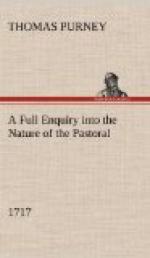Teach me to grieve, with bleating Moan, my Sheep, Teach me, thou ever-flowing Stream, to weep; Teach me, ye faint, ye hollow Winds, to sigh, And let my Sorrows teach me how to dye.
The Thought likewise of the Heavens and the Works of Nature wailing along with the Swain, is what Pastoral-Writers all aim at. I need not quote different Authors, for the different Turns that are given to this Thought; I remember Mr. CONGREVE has it in four several Places. The best express’d, I think, is this.
The Rocks can Melt, and Air in Mists
can mourn,
And Floods can weep, and winds to Sighs
can turn, &c.
It seem’s to be turn’d the best next in these Lines.
And now the Winds, which had so long
been still,
Began the swelling Air, with Sighs to
fill, &c.
The Affectation of the Thought show’s it self rather more, I think, in the following Lines.
And see, the Heav’ns to weep in Dew prepare. And heavy Mists obscure the burd’ned Air On ev’ry Tree the Blossoms turn to Tears, And every Bough a weeping Moisture bears.
But give me leave to quote the Thought once more and I have done.
The Marble Weep’s, and with a silent Pace, It’s trickling Tears distil upon her Face. Falsely ye weep, ye Rocks, and falsely Mourn! For never will ye let the Nymph return!
If any should have a Curiosity to see these Thoughts at large, for we have not quoted the whole of ’em, he may find ’em in Congreve’s Pastoral, call’d The Mourning Muse of ALEXIS.
I shall trouble you with but one Thought more of those which we reduce under the Denomination of Refin’d, and that is the ANTITHESIS. I do not just now remember a Line of this Nature in any Author but Mr. PHILIPS; otherwise, I avoid hinting at particular Faults in a Writer who is generally regular and correct, in his Sentiments.
In vain thou seek’st the Cov’rings
of the Grove,
In the cool Shades to sing the Heats of
Love.
SECT. 2.
Of SIMPLE THOUGHTS. And the finest quoted out of SHAKESPEAR and PHILIPS.
’Twould be well if Pastoral-Writers would leave aiming at such Thoughts as these, and endeavour to introduce the Simple Ones in their stead. But what is most surprizing, is, that their false Thoughts are as seldom their own, as their true ones, and they steal all indifferently from THEOCRITUS and VIRGIL. Which shows how necessary it is to be a thorough Critick, if you would be a good Poet.
Pastoral-Writers are sufficiently for Simplicity; nay so much, that they form their Storys or Fables so little and triffling as to afford no Pleasure; is it not strange then that they should be so averse to Simplicity in their Thoughts; where Simplicity would be the greatest Beauty in their Poetry? Pastoral-Writers have all sorts of false Thoughts but those which we may call the Too Simple. I do not indeed know any Author who has such a Thought unless it be our wide-thoughted SHAKESPEAR. And indeed ’tis scarce possible to rise to Simplicity enough, in Pastoral, much less to have a Thought too Simple. SHAKESPEAR’s is this.




